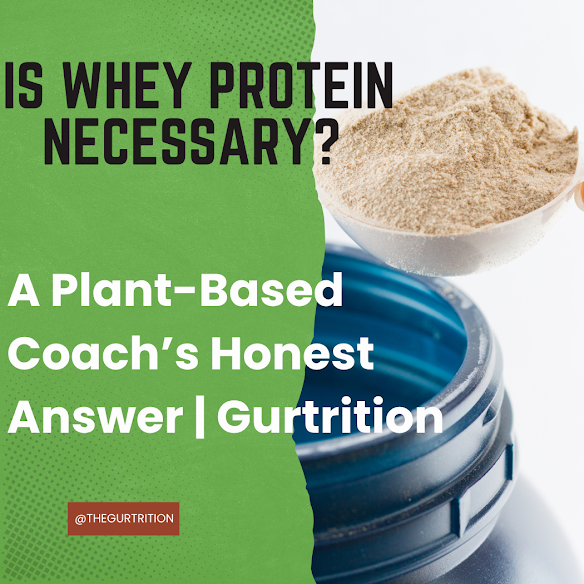Whey protein is made from milk. When cheese is made, the watery part that separates is called whey. It’s processed, flavored, and turned into powder — which many people take for muscle growth after workouts.
Whey has:
- All 9 essential amino acids
- Fast absorption
- Around 20–25g protein per scoop
❌ But Is It Necessary for Muscle Gain?
No. You don’t “need” whey to build muscle. You just need enough total protein — and that can come from plants too.
Your body builds muscle using amino acids. Those amino acids exist in:
- Tofu
- Lentils
- Soya chunks
- Chickpeas
- Peanut butter
- Quinoa
- Oats
- Nuts & seeds
The key is to eat enough total protein every day, whether it comes from whey or whole foods.
💪 Plant Protein vs Whey Protein – Honest Comparison
Feature Whey Protein Plant-Based Foods
Protein per scoop 20–25g 8–15g per 100g (varies)
Digestion Speed Fast Medium
Digestive issues Common (bloating) Rare (if gut-friendly)
Gut health impact Often irritating Mostly healing
Fiber content None High
Nutrients & vitamins Low High
🌿 Real Talk: Why I Recommend Plant-Based Protein
At Gurtrition, we look beyond macros. We focus on:
- Gut health
- Long-term performance
- Whole body recovery
Whey may give fast results, but many people experience:
- Bloating
- Acne
- Stomach issues
- Hormonal imbalance
Plant-based protein, when done right, gives:
- Stable energy
- Clean digestion
- Anti-inflammatory benefits
- And yes — lean muscle growth
🥗 What You Can Use Instead of Whey
Here are my top 5 plant-based protein choices for muscle gain:
- Soya Chunks – 50g protein per 100g (dry)
- Tofu or Tempeh – Great for cooking
- Lentils (Moong, Masoor) – Cheap and powerful
- Quinoa – Complete protein with fiber
- Homemade protein smoothies – With peanut butter, banana, oats, flax seeds
➡️ Pro tip: Mix 3–4 different sources daily to cover all amino acids.
🧠 But What If You Still Want a Protein Powder?
That’s okay too! You can try:
- Pea Protein
- Rice Protein
- Plant-based blends (no soy or dairy)
Look for:
- 20g+ protein per scoop
- No added sugar
- No artificial flavors
🔚 Final Words from Gurtrition
Whey is not magic. Discipline, proper eating, and consistent training are.
Whether you choose whey or not, the real goal is to fuel your body in a way that supports your strength — without harming your gut.
And that’s the Gurtrition way:
🌱 Build muscle. Protect your gut. Eat smart.
📌 Follow @TheGurtrition on Instagram for more muscle tips
🔗 [gurtrition.blogspot]
💬 DM “PLANT PROTEIN” if you want a free 1-day veg muscle meal plan

Comments
Post a Comment